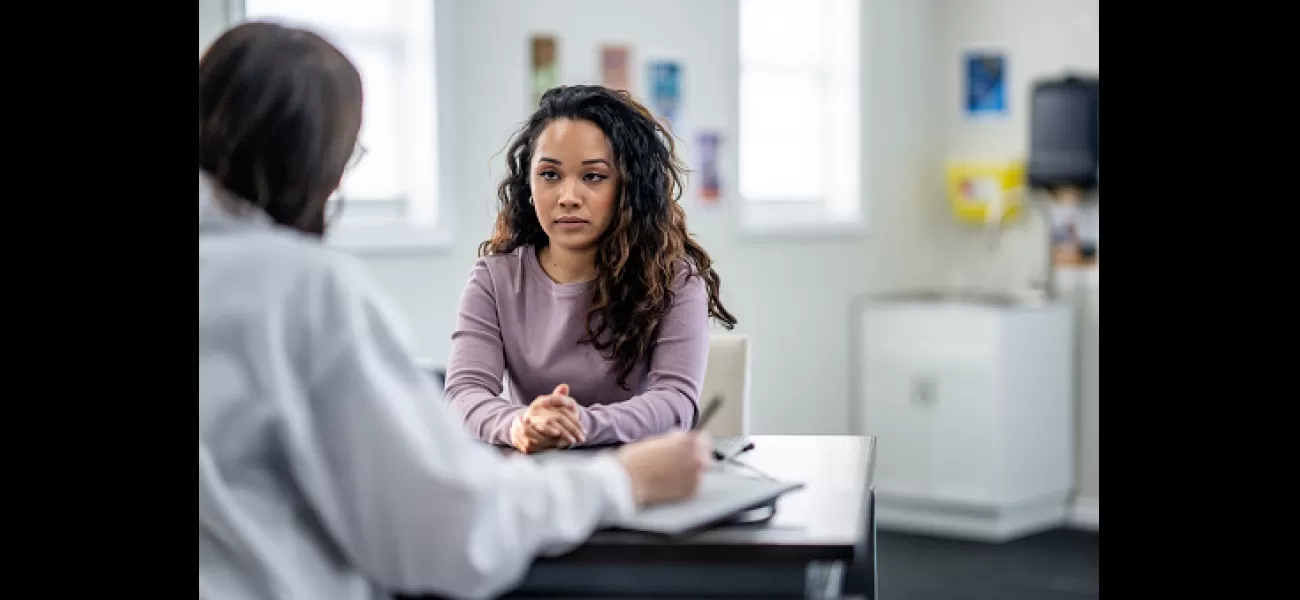Women are often victims of medical gaslighting - learn how to stand up for yourself when seeking medical care.
We have the most knowledge about our own bodies.
July 28th 2024.

Medical gaslighting is a serious and concerning issue that many women face when seeking medical treatment. Jen Parker's story is a perfect example of this harmful phenomenon. At just 10 years old, Jen started experiencing pain and clicking sensations in her hips. She recalls, "I went from being able to do leapfrogs to not being able to do them anymore and losing mobility." However, when she went to her GP, she was told that there was nothing wrong and that her symptoms were just growing pains. The doctor recommended physiotherapy and hydrotherapy, with an X-ray planned for later.
Despite years of physiotherapy, Jen's symptoms persisted, and her mother grew increasingly concerned. She could feel something hitting her when she touched Jen's hip, and she knew it was more than just growing pains. Jen's mother persistently took her back to the doctor, but each time, they dismissed her concerns, attributing it to her age. Unfortunately, this dismissal of her symptoms caused Jen to stop seeking medical help altogether. She shares, "I had been fobbed off so much growing up that I ended up avoiding doctors altogether."
Jen's struggles with pain continued even as she started her first job at 16. She recalls, "I was also having problems with my hands and would worry about dropping plates all the time." Despite working with smaller and less active colleagues, she was the one constantly in pain. She confesses, "I just thought I was weak," and eventually had to quit her job after just four months.
It wasn't until Jen was 22 and traveling in Australia that she finally received a proper diagnosis: ankylosing spondylitis and psoriatic arthritis. However, by then, the damage caused by the delay in diagnosis had become irreversible, leaving permanent damage in her spine, knees, and hips. Sadly, Jen's story is not unique, as many women face similar experiences of being gaslighted by medical professionals.
The term "medical gaslighting" refers to the harmful practice of a doctor dismissing a patient's symptoms as being psychological, such as stress or anxiety, or telling them that they are not really sick. According to the 2022 Women's Health Strategy for England, 84% of women feel unheard by healthcare professionals. Moreover, a recent report by Benenden Health and the Fawcett Society found that 35% of women believe their negative healthcare experiences are influenced by their gender.
Alesha De-Freitas, director of policy, research, and advocacy at the Fawcett Society, explains, "Women shared instances where they've been dismissed because of their gender, race, or even trivial factors like wearing high heels." This issue is a part of the wider gender health gap, which is the institutionalized sexism within healthcare that leads to poorer service and outcomes for women. This gap disproportionately affects older women, women of color, and disabled women.
Lucy Webster, a disabled journalist and author, has also faced medical gaslighting in the past. She explains, "As disabled people, especially disability activists, we are so used to thinking of disability as a social category." However, doctors do not see it that way, and they are always trying to "fix" the person. For many disabled individuals, this can be frustrating, as they do not want to be "fixed." Lucy shares her experience of having insomnia for years, and doctors would dismiss it as a result of her cerebral palsy and pain. However, when she finally received medication that had nothing to do with her disability, her insomnia was resolved. She states, "It was never taken seriously."
Thankfully, Lucy has since found a GP who listens to her and takes quick action on her medical needs. Leah Hazard, a midwife and author, adds, "Misogyny and racism are still rife in society and, to some extent, in the NHS." She also mentions the deeply patriarchal and misogynistic roots of obstetrics and the historical bias towards white people and experiences.
The underrepresentation of women in medical research is also a significant issue. In the 1950s and 1960s, the thalidomide scandal occurred, which led to severe deformities in 10,000 children after the medication was introduced as a morning sickness treatment. This tragedy resulted in women being excluded entirely from clinical trials. It wasn't until 1994 that the Food and Drug Administration allowed women to be included in stage three clinical trials.
Moreover, health journalist and author Sarah Graham explains the "knowledge, trust, and resource gaps" that further exacerbate the gender health gap. She shares, "The first two terms were coined by an American journalist called Maya Dusenbery." The knowledge gap refers to the lack of understanding and research on women's bodies and conditions that disproportionately affect them. This gap also includes how gender-neutral conditions specifically impact women.
The gender health gap becomes even more pervasive when a person falls at the intersection of different marginalized identities. Lucy Webster states, "You are either seen as a disabled person or a woman." She shares her experience of not being told until she was 28 whether she could have children. This lack of understanding and consideration of disabled women's healthcare needs is a systemic failure that needs to be addressed.
Despite these challenges, there are pockets of individuals, like Jen's current GP, who are trying to make a difference. As a society, it is crucial to recognize and address the gender health gap to ensure that all individuals receive proper and timely medical care, regardless of their gender or other marginalized identities. Have you ever experienced medical gaslighting? Share your experiences in the comments below.
Medical gaslighting is a rising issue that has affected countless individuals, particularly women. One such woman is Jen Parker, who first noticed pain and clicking sensations in her hips at the young age of 10. Despite her concerns and struggles with mobility, her GP brushed off her symptoms as growing pains and recommended physiotherapy. Unfortunately, this treatment continued for years with no improvement, leading Jen's mother to question the diagnosis. However, the response from medical professionals remained the same – they simply attributed her symptoms to her age.
As a result, Jen learned to brush off her pain and avoid doctors altogether. But as she entered the workforce at 16, her back pain and hand problems worsened, eventually leading her to quit her job. It wasn't until she was 22 and traveling in Australia that she finally received a proper diagnosis of ankylosing spondylitis and psoriatic arthritis. However, by then, the damage to her spine, knees, and hips had become irreversible due to the years of delay in receiving a correct diagnosis.
Jen's story is not unique – many women have faced similar experiences of medical gaslighting, where their symptoms are dismissed as psychological or they are told they are not truly sick. The 2022 Women's Health Strategy for England found that a staggering 84% of women feel unheard by healthcare professionals, and a report by Benenden Health and the Fawcett Society revealed that 35% of women believe their negative healthcare experiences are influenced by their gender.
Alesha De-Freitas, director of policy, research, and advocacy at the Fawcett Society, explains that women have shared instances where they have been dismissed because of their gender, race, or even trivial factors like wearing high heels. This phenomenon is not limited to individual experiences – it is part of the wider gender health gap, which refers to the institutionalized sexism within healthcare that leads to poorer service and outcomes for women. This gap disproportionately affects older women, women of color, and disabled women.
Lucy Webster, a disabled journalist and author, has also faced medical gaslighting in the past. She shares how doctors often try to "fix" her, not understanding that her disability is a part of her identity and cannot be "fixed." This often leads to her medical needs being overlooked, such as her struggles with insomnia being dismissed as a symptom of her cerebral palsy instead of being taken seriously and treated accordingly.
Fortunately, Lucy has found a GP who listens to her needs and acts on them quickly. But Leah Hazard, a midwife, and author, points out that misogyny and racism are still prevalent in society and, to some extent, in the NHS. She also highlights the patriarchal and racist roots of obstetrics and the historical bias towards white people and experiences. Women have also been significantly underrepresented in medical research, with the thalidomide scandal in the 1950s and 1960s being a prime example of the consequences of excluding women from clinical trials.
This exclusion has led to a lack of knowledge about women's bodies, conditions that disproportionately affect women, and the impact of gender-neutral conditions on women. Health journalist and author Sarah Graham further explains this as the "knowledge, trust, and resource gaps," where there is less understanding and research on women's health issues compared to men's. These gaps have led to a systemic failure to see disabled women as individuals who require specific women's healthcare and information about women's health issues.
Have you ever felt like your medical concerns have been dismissed? Unfortunately, Jen's and Lucy's stories are just two examples of the countless women who have faced medical gaslighting. It is crucial to address this issue and strive for a more inclusive and understanding healthcare system that takes into account the unique experiences and needs of all individuals, regardless of their gender, race, or disability.
Despite years of physiotherapy, Jen's symptoms persisted, and her mother grew increasingly concerned. She could feel something hitting her when she touched Jen's hip, and she knew it was more than just growing pains. Jen's mother persistently took her back to the doctor, but each time, they dismissed her concerns, attributing it to her age. Unfortunately, this dismissal of her symptoms caused Jen to stop seeking medical help altogether. She shares, "I had been fobbed off so much growing up that I ended up avoiding doctors altogether."
Jen's struggles with pain continued even as she started her first job at 16. She recalls, "I was also having problems with my hands and would worry about dropping plates all the time." Despite working with smaller and less active colleagues, she was the one constantly in pain. She confesses, "I just thought I was weak," and eventually had to quit her job after just four months.
It wasn't until Jen was 22 and traveling in Australia that she finally received a proper diagnosis: ankylosing spondylitis and psoriatic arthritis. However, by then, the damage caused by the delay in diagnosis had become irreversible, leaving permanent damage in her spine, knees, and hips. Sadly, Jen's story is not unique, as many women face similar experiences of being gaslighted by medical professionals.
The term "medical gaslighting" refers to the harmful practice of a doctor dismissing a patient's symptoms as being psychological, such as stress or anxiety, or telling them that they are not really sick. According to the 2022 Women's Health Strategy for England, 84% of women feel unheard by healthcare professionals. Moreover, a recent report by Benenden Health and the Fawcett Society found that 35% of women believe their negative healthcare experiences are influenced by their gender.
Alesha De-Freitas, director of policy, research, and advocacy at the Fawcett Society, explains, "Women shared instances where they've been dismissed because of their gender, race, or even trivial factors like wearing high heels." This issue is a part of the wider gender health gap, which is the institutionalized sexism within healthcare that leads to poorer service and outcomes for women. This gap disproportionately affects older women, women of color, and disabled women.
Lucy Webster, a disabled journalist and author, has also faced medical gaslighting in the past. She explains, "As disabled people, especially disability activists, we are so used to thinking of disability as a social category." However, doctors do not see it that way, and they are always trying to "fix" the person. For many disabled individuals, this can be frustrating, as they do not want to be "fixed." Lucy shares her experience of having insomnia for years, and doctors would dismiss it as a result of her cerebral palsy and pain. However, when she finally received medication that had nothing to do with her disability, her insomnia was resolved. She states, "It was never taken seriously."
Thankfully, Lucy has since found a GP who listens to her and takes quick action on her medical needs. Leah Hazard, a midwife and author, adds, "Misogyny and racism are still rife in society and, to some extent, in the NHS." She also mentions the deeply patriarchal and misogynistic roots of obstetrics and the historical bias towards white people and experiences.
The underrepresentation of women in medical research is also a significant issue. In the 1950s and 1960s, the thalidomide scandal occurred, which led to severe deformities in 10,000 children after the medication was introduced as a morning sickness treatment. This tragedy resulted in women being excluded entirely from clinical trials. It wasn't until 1994 that the Food and Drug Administration allowed women to be included in stage three clinical trials.
Moreover, health journalist and author Sarah Graham explains the "knowledge, trust, and resource gaps" that further exacerbate the gender health gap. She shares, "The first two terms were coined by an American journalist called Maya Dusenbery." The knowledge gap refers to the lack of understanding and research on women's bodies and conditions that disproportionately affect them. This gap also includes how gender-neutral conditions specifically impact women.
The gender health gap becomes even more pervasive when a person falls at the intersection of different marginalized identities. Lucy Webster states, "You are either seen as a disabled person or a woman." She shares her experience of not being told until she was 28 whether she could have children. This lack of understanding and consideration of disabled women's healthcare needs is a systemic failure that needs to be addressed.
Despite these challenges, there are pockets of individuals, like Jen's current GP, who are trying to make a difference. As a society, it is crucial to recognize and address the gender health gap to ensure that all individuals receive proper and timely medical care, regardless of their gender or other marginalized identities. Have you ever experienced medical gaslighting? Share your experiences in the comments below.
Medical gaslighting is a rising issue that has affected countless individuals, particularly women. One such woman is Jen Parker, who first noticed pain and clicking sensations in her hips at the young age of 10. Despite her concerns and struggles with mobility, her GP brushed off her symptoms as growing pains and recommended physiotherapy. Unfortunately, this treatment continued for years with no improvement, leading Jen's mother to question the diagnosis. However, the response from medical professionals remained the same – they simply attributed her symptoms to her age.
As a result, Jen learned to brush off her pain and avoid doctors altogether. But as she entered the workforce at 16, her back pain and hand problems worsened, eventually leading her to quit her job. It wasn't until she was 22 and traveling in Australia that she finally received a proper diagnosis of ankylosing spondylitis and psoriatic arthritis. However, by then, the damage to her spine, knees, and hips had become irreversible due to the years of delay in receiving a correct diagnosis.
Jen's story is not unique – many women have faced similar experiences of medical gaslighting, where their symptoms are dismissed as psychological or they are told they are not truly sick. The 2022 Women's Health Strategy for England found that a staggering 84% of women feel unheard by healthcare professionals, and a report by Benenden Health and the Fawcett Society revealed that 35% of women believe their negative healthcare experiences are influenced by their gender.
Alesha De-Freitas, director of policy, research, and advocacy at the Fawcett Society, explains that women have shared instances where they have been dismissed because of their gender, race, or even trivial factors like wearing high heels. This phenomenon is not limited to individual experiences – it is part of the wider gender health gap, which refers to the institutionalized sexism within healthcare that leads to poorer service and outcomes for women. This gap disproportionately affects older women, women of color, and disabled women.
Lucy Webster, a disabled journalist and author, has also faced medical gaslighting in the past. She shares how doctors often try to "fix" her, not understanding that her disability is a part of her identity and cannot be "fixed." This often leads to her medical needs being overlooked, such as her struggles with insomnia being dismissed as a symptom of her cerebral palsy instead of being taken seriously and treated accordingly.
Fortunately, Lucy has found a GP who listens to her needs and acts on them quickly. But Leah Hazard, a midwife, and author, points out that misogyny and racism are still prevalent in society and, to some extent, in the NHS. She also highlights the patriarchal and racist roots of obstetrics and the historical bias towards white people and experiences. Women have also been significantly underrepresented in medical research, with the thalidomide scandal in the 1950s and 1960s being a prime example of the consequences of excluding women from clinical trials.
This exclusion has led to a lack of knowledge about women's bodies, conditions that disproportionately affect women, and the impact of gender-neutral conditions on women. Health journalist and author Sarah Graham further explains this as the "knowledge, trust, and resource gaps," where there is less understanding and research on women's health issues compared to men's. These gaps have led to a systemic failure to see disabled women as individuals who require specific women's healthcare and information about women's health issues.
Have you ever felt like your medical concerns have been dismissed? Unfortunately, Jen's and Lucy's stories are just two examples of the countless women who have faced medical gaslighting. It is crucial to address this issue and strive for a more inclusive and understanding healthcare system that takes into account the unique experiences and needs of all individuals, regardless of their gender, race, or disability.
[This article has been trending online recently and has been generated with AI. Your feed is customized.]
[Generative AI is experimental.]
0
0
Submit Comment





